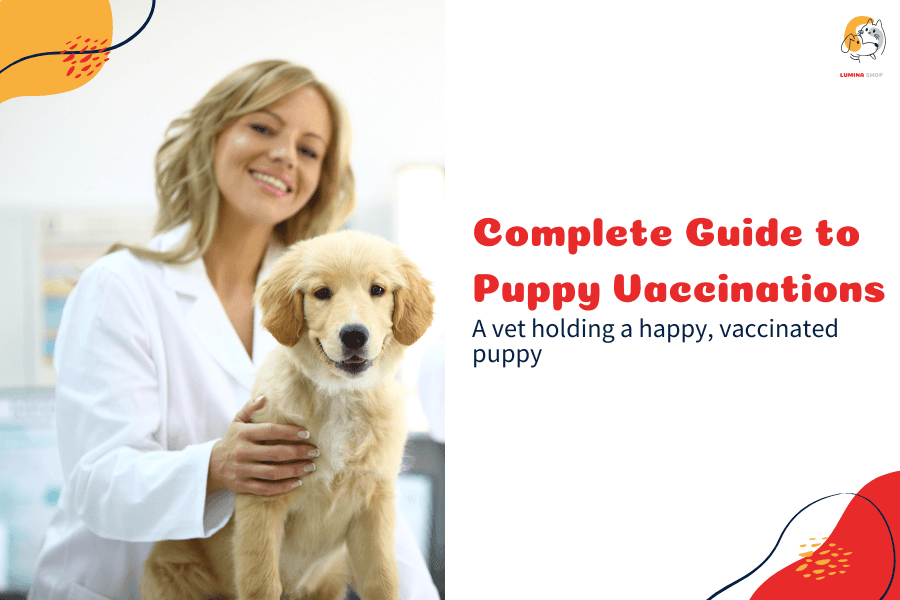
What vaccinations does my puppy need?
Vaccinations are a critical part of your puppy’s health care. They help protect against serious and potentially fatal diseases, ensuring your pup grows up happy and healthy. But which vaccinations does your puppy need, and when should they get them?
In this guide, we’ll cover core and non-core vaccinations, the recommended schedule, and why immunization is essential for your puppy’s long-term well-being.
Recommended Product:
Pet First Aid Kit – A must-have for keeping your puppy safe and prepared for minor emergencies.

1. Why Are Puppy Vaccinations Important?
Vaccinations protect your puppy from contagious diseases that can be life-threatening. They also help prevent the spread of infections to other pets and humans.
✔ Boosts Immunity – Strengthens your puppy’s ability to fight off diseases.
✔ Prevents Deadly Illnesses – Protects against life-threatening viruses like parvovirus and distemper.
✔ Required for Boarding & Travel – Many facilities require up-to-date vaccinations.

2. Core Vaccinations for Puppies (Essential Shots)
Core vaccines are required for all puppies because they protect against the most dangerous and contagious diseases.
| Vaccine | What It Protects Against | First Dose | Booster Shots |
|---|---|---|---|
| DHPP (Distemper, Hepatitis, Parvovirus, Parainfluenza) | Prevents severe viral infections | 6-8 weeks | Every 3-4 weeks until 16-18 weeks, then annually |
| Rabies | Fatal virus affecting the nervous system | 12-16 weeks | 1 year later, then every 1-3 years |
Recommended Product:
Comfortable Puppy Carrier – Helps transport your puppy safely to vet visits.

3. Non-Core Vaccinations for Puppies (Optional but Recommended)
Non-core vaccines are recommended based on your puppy’s lifestyle and risk factors.
| Vaccine | What It Protects Against | Who Needs It? |
|---|---|---|
| Bordetella (Kennel Cough) | Respiratory infection | Dogs in boarding, daycare, or training classes |
| Leptospirosis | Bacterial disease affecting the liver and kidneys | Puppies in rural or high-risk areas |
| Lyme Disease | Tick-borne bacterial infection | Dogs in tick-heavy environments |
| Canine Influenza | Flu-like respiratory virus | Dogs in social settings or high-risk areas |

4. Puppy Vaccination Schedule
Your vet will follow a standard vaccination schedule to ensure your puppy gets the right shots at the right time.
| Age | Vaccinations Needed |
|---|---|
| 6-8 weeks | DHPP (1st dose), Bordetella (optional) |
| 10-12 weeks | DHPP (2nd dose), Leptospirosis (optional), Canine Influenza (optional) |
| 14-16 weeks | DHPP (3rd dose), Rabies |
| 6-12 months | DHPP booster, Rabies booster |
Recommended Product:
Calming Treats for Puppies – Helps reduce stress during vet visits.

5. What to Expect After Puppy Vaccinations
After getting vaccinated, puppies may experience mild side effects like:
✔ Temporary soreness at the injection site
✔ Mild fever or fatigue
✔ Decreased appetite for a short time
If you notice severe reactions (vomiting, swelling, or breathing difficulties), contact your vet immediately.
Recommended Product:
Soft Puppy Bed – Provides a cozy resting space after vaccinations.

6. How to Keep Your Puppy Healthy After Vaccinations
🩺 Regular Vet Checkups – Schedule routine vet visits to monitor health.
🏡 Clean Living Environment – Keep your puppy’s space sanitized to reduce disease risk.
🐶 Proper Nutrition – Feed high-quality puppy food for a strong immune system.

Conclusion
Puppy vaccinations are essential for protecting against deadly diseases. By following the recommended vaccination schedule, you ensure your puppy grows up strong and healthy.
For vet visit essentials, check out Lumina Pet Shop for calming treats, carriers, and first-aid kits.
Stay proactive about your puppy’s health—vaccinate on time for a happy, healthy pup! 🐶
